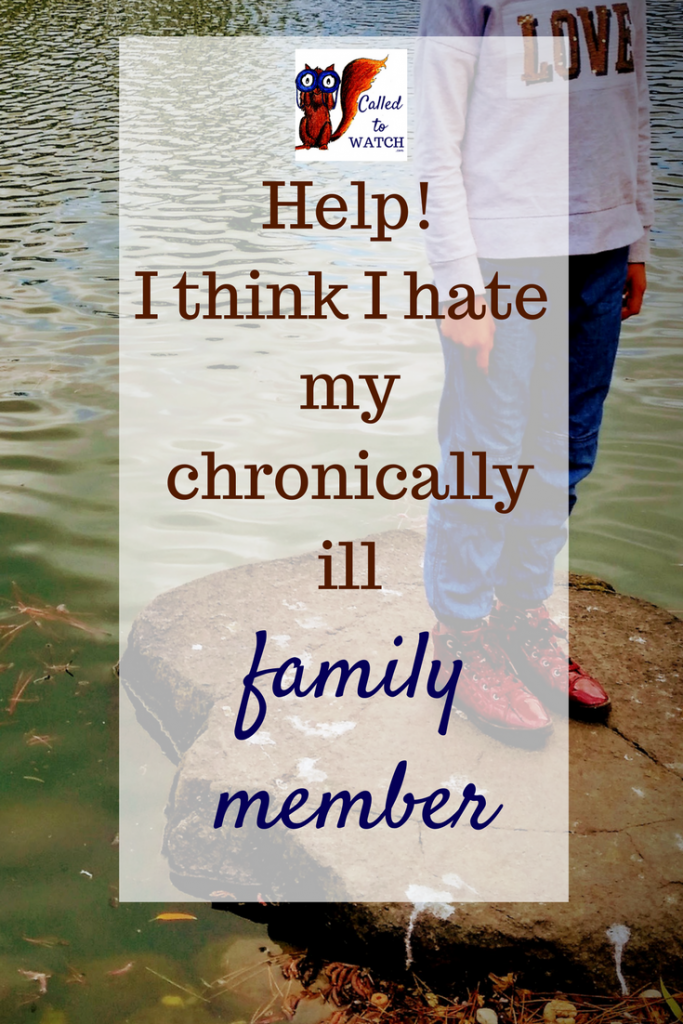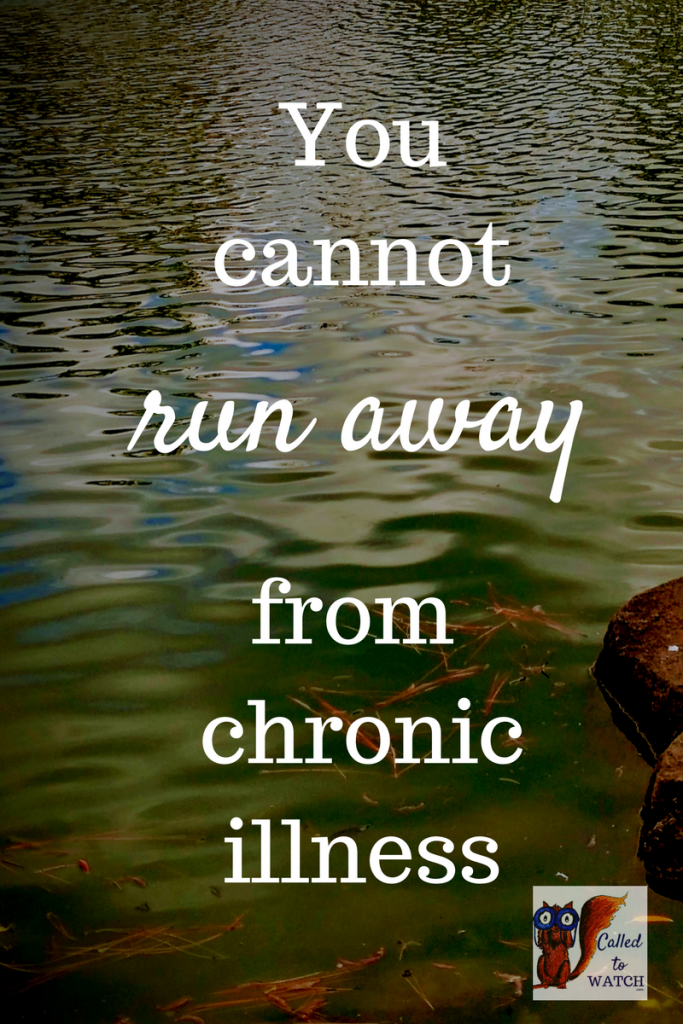Dislike
Frustrated at
Disapprove of
Am annoyed at
Would like to strangle
Does the sentence ring true for you now? Has it ever? If so, this post is for you.
We all live in relationship with other people.
It’s different though, when one of the members of the relationship is always sick. Whether it’s our spouse who is constantly hurting, or our sibling who is often in pain, it makes the relationship difficult.
It can mean their ability to engage in social niceties is limited. Often it means we can’t simply leave them whenever we want – there is no ‘space’ or ‘time out’ in our relationship.
Often this is okay. Other times it’s just too much. And there are some days where we can’t stand the sight of our chronically ill loved ones.
We feel like we are about to explode in frustration or annoyance. Our reservoirs of sympathy have dropped to critical level and we just want to grab them and shake them – or yell, wave our arms and leave.
With no plans to return.
But then we feel guilty. We are absolutely awful people. How can we possible get angry at someone who is sick? How can we stand and yell at someone whom society tells us is more vulnerable than ourselves?
After these thoughts, it’s easy for our frustration to double.
It’s not fair.
Why are other people allowed to have fights with their partner but we can’t? This sickness, it gets in the way of everything. There’s no release for our emotions.
You can’t run away from chronic illness – Tweet!
But what triggers our frustration?
Let’s start at the root of the problem. There are many reasons we feel annoyed at our chronically ill loved one. Perhaps:
- They aren’t looking after themselves in the way we think they ought
- They aren’t treating us in the way we believe we should be treated. They snap at us when we’re trying to help, they have unreasonable expectations.
- Their sickness is negatively impacting our life. Their attitude is upsetting us, or perhaps their sickness limits the type of activities we can enjoy with them – or dictates them
- They are not reacting in the way we think they should be. They are too negative, too naïve, too positive.
Now these points could be valid and right – or they could be the result of a twisted perception of the world and our own importance. Before we accept them as valid triggers for our frustrations, we need to ask an important question…
Is it our fault?
We’ve agreed that relationships with chronically ill people can be frustrating. But whose fault is it?
Is it an ‘us’ thing, or a ‘them’ thing?
I’d like to propose that it is both.
In almost every situation we will both be to blame. That’s just how this broken world works. We can’t seem to stop ourselves sinning. Someone wrongs us – and we’ve wronged them before we even have a chance to think about it.
Still, this doesn’t mean we don’t need to question our own motives or actions. After all, it takes one person to initiate a disagreement and one person to exacerbate it – and they don’t have to be the same person.
It is possible to minimise the effects of chronic illness in my relationship?
Our reactions of frustration or fury are often the result of unmet expectations. What are our expectations for this chronic illness relationship? Are they appropriate?
Let us remember:
- Our Loved Ones are not in our debt. At least, not if we are caring for them and sharing life with them out of love. Love keeps no tallies or holds no debts. Is our anger the result of a feeling that we’ve been ‘ripped off’?
- We are holding unrealistic expectations on how a sick person, or how our loved One should act. Are we holding them to a higher standard than we hold ourselves?
- Our Loved One is only human, and so are we. We get annoyed with our healthy friends as well as our sick ones. It’s part of our flawed hearts and destroyed loves. Are we expecting ‘sickness’ or ‘tragedy’ to be a cure to our sin?
- Illness does impact people. Pain does not make us into the best version of ourselves. It is true that hardship can refine one’s character, but it doesn’t have to. And it often only develops one aspect (ie. perseverance) unless the individual is actively pursuing the others. On the contrary, pain normally shortens fuses and cramps benevolence. Are we forgetting the type of person we are when we’re in pain?
And so we live and love our chronically ill spouse, friend or relative
There’s no doubt that chronic illness affects relationships.
Sometimes the most important thing we can do is realise that, accept it, and move on.
We can’t choose chronic illness – but we can choose how we will respond to it. We can decide whether we will snap back, or clutch onto our resentment, or let go of our anger.
How we live in the context of our chronically ill relationship is important.
//Do you ever struggle to love people who are sick? What is it about the situation you find frustrating or disheartening? Comment below or join the conversation!
PS: Enjoyed the post above? Get the next one delivered straight to you! Sign up for email notifications
I’m also on Facebook, Pinterest & Twitter! Meet me there for more interesting reads, resources and community.




I help to lead a cancer support group and I think for some instances the disease is harder (in some ways) on the caretaker who has no control. It’s a very difficult situation where love is the glue that holds the relationship together.
It is a very difficult situation. I also think there is no ‘harder’ or ‘hardest’, not really. Each person has a slightly different experience, with unique fears and joys – but you are right, love is what lasts! 🙂 Thank you for your thoughts Char.
For someone who struggles with a chronic illness I greatly appreciate this post. Thank you for putting into words what so many of us find hard to communicate. There are times when people think I don’t care, when I do it is just so hard when the pain is high to show anything. But I do care and appreciate everyone who supports me. Many Thanks! 8)
Thank you for your encouragement Debra! Not having a chronic illness myself, I am often scared my words will hurt those who are suffering, so your comment means a lot 🙂
I’ve taken care of my chronically ill mother since I was 14 and now, I am a college student who is stuck at home due to Covid. I’ve always been the primary care taker since my father doesn’t live with us and my brother is younger than me so I’ve had virtually no support, emotional or physical. I don’t hate her. I know I care for her, but at this point, I don’t know if it’s love. When I tell her that taking care of her isn’t easy, she says “well I want to die too so I don’t bother you all or maybe you should put me in hospital,” I feel so frustrated and can’t help but think she’s being emotionally manipulative. What should I do?
Hi Robin 🙂 Thank you for taking the time to share honestly. That takes real bravery. It sounds like life has been hard for a long time for you, and especially with COVID! It also sounds like a difficult, complex situation, and it definitely sounds like you need support. I will pray for you and your situation right now. Do you have any extended family you can speak to, or any church or community friends? Sometimes in these situations getting a third person into the conversation can be really helpful, although a difficult step to take. I would encourage you to keep speaking honestly and kindly with your Mum, however painful and difficult it may be. When people are in a lot of pain, they can be angry or bitter and that’s really hard to deal with, but isn’t always reflective of who they really are, or even how they really feel. Bring up the subject with her (of getting someone else involved); I think getting support is probably the most important thing, for both you and her. Oh it’s so hard. I grieve with you Robin.
This is a helpful article with a unique perspective. I’m the ill one and I’ve had to cut everyone but my husband out of my life because they are all super mean to me, but on the sly. They can be outright rude to me and/or passive aggressive, and covertly cruel. I sure don’t need that on top of everything else I’m dealing with. As I read this blog I realized that they probably do all actually hate me. It makes sense and I know it’s not really personal, it’s my illness and pain causing this reaction in them, but I can’t change it, so I gotta accept it. This life is very hard but I find I can keep my spirits up quite well when I don’t have to fake it with others in order to pretend that everything’s really fine between us, because it isn’t!
Ah Nightengale, thank you for sharing so honestly. It sounds like a really difficult situation and I’m sorry you’re going through it. Clear and open communication is so important. It’s really hard to know or guess what others are thinking, and difficult to be vulnerable yourself. My prayer is that you are able to communicate well and be heard, and seek out Jesus who always hears and truly understands.
If you hate your chronically ill relative or friend you need to seek help from Jesus Christ. This is the most messed up article I’ve ever read in my life. Wow….
Thanks for your comment. This article is seeking to be honest and vulnerable – I think it’s worth recognising that factors like chronic illness do complicate relationships, that’s natural. And yes, Jesus is the answer, as other articles on this site clearly testify, but often the first step is understanding our emotions, thoughts and struggles.